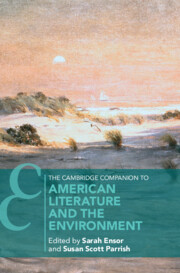Book contents
- The Cambridge Companion to American Literature and the Environment
- The Cambridge Companion to American Literature and the Environment
- Copyright page
- Dedication
- Contents
- Figures
- Contributors
- Acknowledgments
- A Note on the Cover Image
- Introduction
- Part I Environmental Histories
- Part II Environmental Genres and Media
- Part III Environmental Spaces, Environmental Methods
- Chapter 11 Urban Narrative and the Futures of Biodiversity
- Chapter 12 Japanese American Incarceration and the Turn to Earth: Looking for a Man Named Komako in Bad Day at Black Rock
- Chapter 13 Leisure over Labor: Latino Outdoors and the Production of a Latinx Outdoor Recreation Identity
- Chapter 14 Sanctuary: Literature and the Colonial Politics of Protection
- Chapter 15 The Queer Restoration Poetics of Audre Lorde
- Notes
- Index
- Cambridge Companions to …
Chapter 11 - Urban Narrative and the Futures of Biodiversity
from Part III - Environmental Spaces, Environmental Methods
Published online by Cambridge University Press: 10 March 2022
- The Cambridge Companion to American Literature and the Environment
- The Cambridge Companion to American Literature and the Environment
- Copyright page
- Dedication
- Contents
- Figures
- Contributors
- Acknowledgments
- A Note on the Cover Image
- Introduction
- Part I Environmental Histories
- Part II Environmental Genres and Media
- Part III Environmental Spaces, Environmental Methods
- Chapter 11 Urban Narrative and the Futures of Biodiversity
- Chapter 12 Japanese American Incarceration and the Turn to Earth: Looking for a Man Named Komako in Bad Day at Black Rock
- Chapter 13 Leisure over Labor: Latino Outdoors and the Production of a Latinx Outdoor Recreation Identity
- Chapter 14 Sanctuary: Literature and the Colonial Politics of Protection
- Chapter 15 The Queer Restoration Poetics of Audre Lorde
- Notes
- Index
- Cambridge Companions to …
Summary
Cities have traditionally been neglected settings in environmental writing and ecologically oriented literary criticism, but have played a central role in the thought and writings of the environmental justice movement. Recently, they have also come into focus as “novel ecosystems” of their own in fiction and nonfiction. This chapter surveys two thematic emphases in environmental literature that portrays cities at risk from either toxicity or climate change, both of which continue to emphasize the antagonism between urban landscapes and the forces of nature by describing cities as either sources or targets of environmental risk. It then focuses on a third and less explored approach to the city as a multispecies community to outline four recurrent templates: the awareness narrative in which individuals or communities discover urban species; the narrative of urban return in which wild species reclaim the city; narratives about cities as sites of newly emergent species through evolution or technological modification; and narratives of urban bonds between humans and nonhumans. All of these narratives shift the emphasis from the city as an ecological wasteland to a new understanding of novel urban ecosystems and novel biological habitats that need to be understood in terms of multispecies justice.
Keywords
- Type
- Chapter
- Information
- Publisher: Cambridge University PressPrint publication year: 2022



